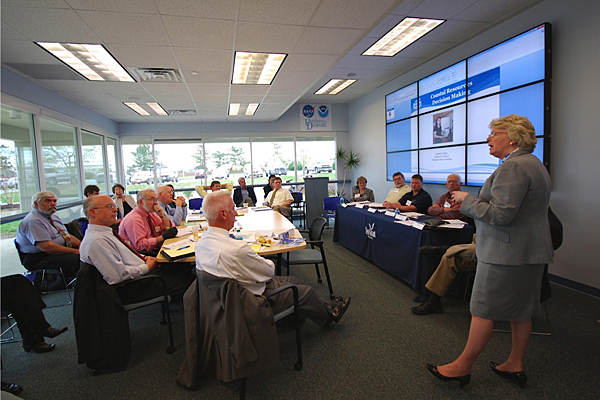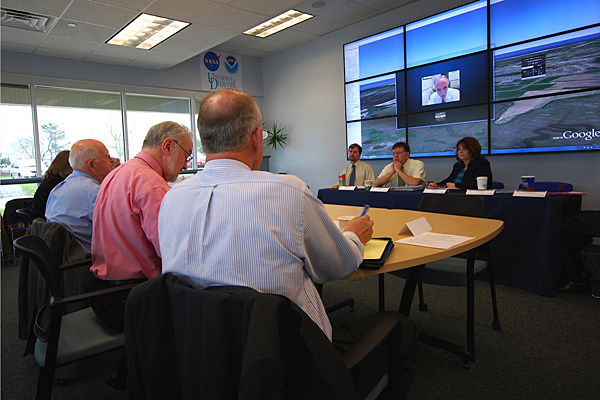


Sea Grant success
Delaware Sea Grant program commended for research, education, outreach
9:55 a.m., Nov. 18, 2011--For the past 35 years, the Delaware Sea Grant College Program (DESG) has supported marine and coastal research, graduate education and public outreach in areas ranging from aquaculture and water quality to rip currents and coastal storm effects.
Now, a national review panel has confirmed that DESG, located at the University of Delaware, is doing an excellent job at meeting this three-part mission. In its recently issued report, the panel referred to DESG as “an energetic and innovative Sea Grant Program that is deeply embedded in coastal management issues throughout the state.”
Campus Stories
From graduates, faculty
Doctoral hooding
The program is a partnership among the National Oceanic and Atmospheric Administration (NOAA), the state of Delaware and UD.
The review team, which conducted a two-day site visit in April 2011, included experts in research, fisheries, outreach and education appointed by NOAA’s National Sea Grant College Program. The team reviewed and discussed broad issues related to DESG’s organization and program management, stakeholder engagement and collaborative activities.
Their report lauded the program leadership for being “strong, proactive, and participatory” and said that “the state of coastal management in Delaware is much improved by DESG’s research and engagement activities.”
DESG was also commended for the diversity of its funding from sources other than Sea Grant, including significant NOAA funding from a broad range of offices such as the Coastal Services Center, the National Estuarine Research Reserves, the NOAA Chesapeake Bay Office, NOAA Fisheries, the Geodetic Survey Office and the Centers for Coastal Ocean Science.
In addition, the reviewers congratulated DESG on “the breadth and quality of its program and its forward‐thinking response to new opportunities in areas such as renewable energy and sustainable coastal development.”
“During the site visit, the review team heard from many stakeholders about the importance of the connections among the University, the state, and the public and how together we make a difference for Delaware and the nation,” says DESG director Nancy Targett, who is also dean of UD’s College of Earth, Ocean, and Environment. “We have a great team, and it was a real delight to have their work and its impacts validated by a national review panel.”
About the review
The site visit took place at the Otis Smith Laboratory on UD’s Hugh R. Sharp Campus in Lewes, Del., on April 12 and 13, 2011. The agenda included a welcome by UD Provost Tom Apple and a presentation on program management by DESG director Nancy Targett and staff. The remainder of the review was conducted in a panel format, with panels of four to six partners or stakeholders formed around various case studies such as water quality, wind energy and sustainable seafood.
Prior to the review, the public was notified of the site visit through a variety of media and invited to provide input to the evaluation. The review team chair received three letters in response to the public notice, all positive.
About Delaware Sea Grant
Since UD was named the nation’s ninth Sea Grant college in 1976, the program has supported research on a broad range of topics. Current areas of focus include healthy coastal ecosystems, sustainable coastal development, safe and sustainable seafood supply, and hazard resilience in coastal communities. The program has also educated hundreds of graduate students in marine science and disseminated research-based information to the public through its Marine Advisory Service and Marine Public Education Office.
About the National Sea Grant College Program
Sea Grant’s mission includes environmental stewardship, long-term economic development, and responsible use of America’s coastal, ocean, and Great Lakes resources. Sea Grant is a nationwide network, administered through the National Oceanic and Atmospheric Administration, of 32 university-based programs that work with coastal communities.
The National Sea Grant College Program engages this network of the nation’s top universities in conducting scientific research, education, training, and extension projects designed to foster science-based decisions about the use and conservation of the nation’s aquatic resources.
Sea Grant is NOAA’s primary university-based program in support of coastal resource use and conservation. Sea Grant’s research and outreach programs promote better understanding, conservation and use of America’s coastal resources. In short, Sea Grant is “science serving America’s coasts.”
Article by Diane Kukich









